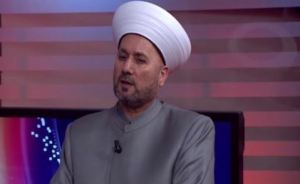nsnbc : The mufti of Iraq’s Sunni community, through a representative, said the Iraqi governments’ oppression against Kurds prompted the Kurdistan Autonomous Region to seek independence. He also said Iraq has become a sectarian state run by Iranian – Shia – politicians. However, Kurds have been let down by Shia and Sunni powers in the region.
 Rafi al-Rufai said through his representative Abdulwahab Ani, that Baghdad’s “baseless” decision to cut the Kurdistan Region’s budget share in 2014, during Nouri al-Maliki’s tenure as prime minister, prompted the Kurdistan nation to determine its fate in an independence referendum.
Rafi al-Rufai said through his representative Abdulwahab Ani, that Baghdad’s “baseless” decision to cut the Kurdistan Region’s budget share in 2014, during Nouri al-Maliki’s tenure as prime minister, prompted the Kurdistan nation to determine its fate in an independence referendum.
“When oppressions accumulated against the Kurdish nation, they began holding a referendum to stay away from these tyrants,” Ani said reading a message from the Iraqi Mufti Rufai in a press conference in Erbil.
Referring to authorities in Baghdad, Rufai says “If the judges were just for the people preserving their homes and dignity…the Kurdish nation would not hold the referendum to determine their fate. But they continued their tyranny.”
He also highly appreciated the Kurdistan Autonomous Region(KAR) for hosting over a million internally displaced persons and refugees when fleeing ISIS. “And you want to impose sanctions on Kurds, fight with them and close air and ground ports on them?” he asked.
He rejected comments from the Iraqi government authorities who accuse the Kurdsitan Region of partitioning Iraq. “The Iraqi government and its parliament, you should cry and not talk for the integrity of Iraq. You yourself partitioned it.”
The Iraqi Sunni Mufti went on to slam the Iraqi government’s “sectarian” policies. “The main dangerous thing that these governments carried with them was the disgusting sectarianism which partitioned the integrity of this country and spread hatred among the components of this country,” he said. “Those running and ruling Iraq are associated with Iranian politicians,” said the Sunni cleric. “Among those is Qassem Solaimani.”
Solaimani is Iran’s most powerful man in Iraq and commander of Iran’s elite Quds Force. He was reportedly leading the Iraqi Army and its allied Shiite militia in the fight against ISIS in many areas ISIS once held. The Iraqi Mufti also accused the Iraqi government and Shiite militia of “destroying Sunni cities and homes, all of this under the pretext of liberating them from ISIS.”
In the wake of the Kurdistan Region’s independence referendum, Baghdad harshly responded taking “punitive measures” against Erbil with the Kurdistan government and parliament both calling the measures “collective punishment” against the Region and rejecting to comply with the decisions.
Iraq was governed by a Sunni minority under the late Saddam Hussein, opposing the Shia Iran while keeping Saudi Arabia’s extremely fundamentalist form of Islam at bay. It was after the long-simmering conflict between the Baath party government of Saddam Hussein and Kuwait, and by implication Saudi Arabia and the USA turned into an armed conflict, that the very uneasy balance in Iraq was destroyed during the 1st and 2nd Iraq war and the murder of Saddam Hussein after a show trial.
The government of al-Maliki was known for being anti-Sunni to the extend that it was described as paranoid, even though al-Maliki was indeed confronted by a plan to invade the country with the help of ISIS – a plan that according to a source close to Saad Hariri was set in motion during the Atlantic Council’s Energy Summit in Turkey in November 2013. It did not come as a great surprise that many Iraqi Sunni – within the military as well as ousted former elites – would support the Islamic State as a means to get rid of the Iranian – Shia influence. Chaos ensued – controlled chaos would many analysts say – the rest is history.
It is worth noting that Iraq’s Kurds also were targeted by Iraq’s Sunni and resisted against Sunni oppression. It may even be more noteworthy that Shia Iran backed Iraqi Kurds during the Iran – Iraq war – that the use of poison gas (Anfal) against Kurds was in part forced by the presence of Iranian troops among Kurds, and that Iranians then also made promises to Iranian Kurds – promises about more justice, greater recognition, more independence, that were never kept.
CH/L – nsnbc 02.10.20017
Source Article from https://nsnbc.me/2017/10/02/iraqs-sunni-mufti-said-oppression-led-kurds-to-seek-independence/
Related posts:
Views: 0
 RSS Feed
RSS Feed

















 October 2nd, 2017
October 2nd, 2017  Awake Goy
Awake Goy 










 Posted in
Posted in  Tags:
Tags: 
















